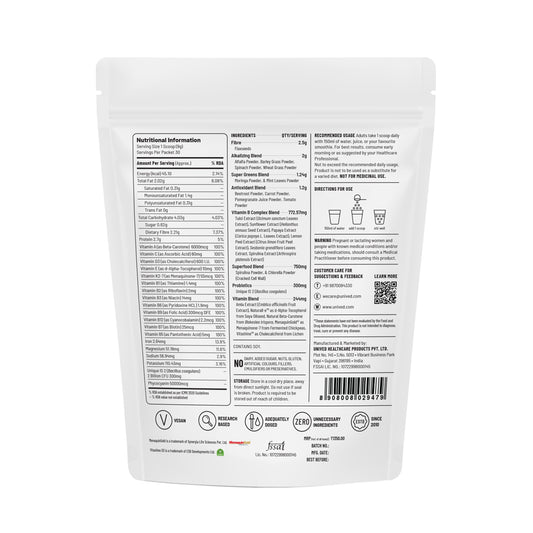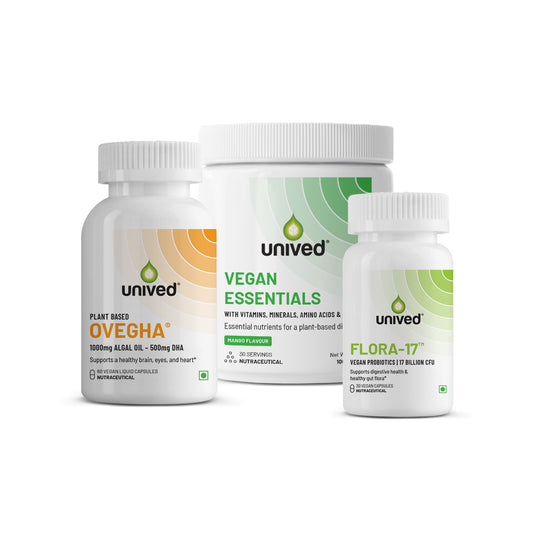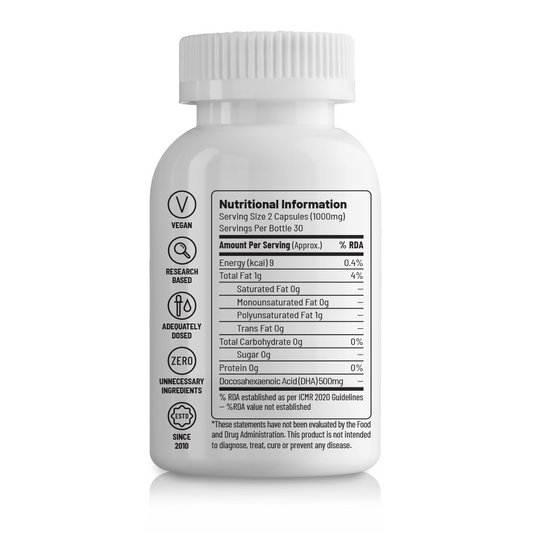Gut Health
Healthy gut is the key to overall wellness. Good gut health
helps to improve digestive health as well. Gut health can be disturbed by
various factors like improper diet, lifestyle, frequent travel, and consumption
of antibiotics. This leads to digestive discomfort.
Probiotics are live microorganisms that upon ingestion in
sufficient concentrations can exert health benefits to the host. The human
gastrointestinal tract is a host to over 500 species of bacteria. Lactobacillus
and bifidobacterium species are the most commonly used probiotics and are
naturally present in the gut. A balance among microbial groups presents in human
gut is crucial for maintaining gut health. When this balance is disturbed, the
host-microbe relationship can progress toward a disease state. Thus, the
maintenance of microbiota equilibrium is important to protect and to promote
gut health [1, 2, 3].
Gut Health and Athletes:
The gut microbiota can be altered especially during
endurance exercise/performance due to increased oxidative stress, intestinal
permeability, electrolyte imbalance, glycogen depletion, etc. Gut microbiota
influences the individual’s ability to perform optimally during exercise due to
its ability to take up energy, modulate the immune system, regulate GI health,
and reverse the inflammatory response after exercise.
Many athletes experience GI symptoms & gut stress
episodes and resulting in performance impairment during competition,
particularly for endurance events such as marathons and triathlons. Due to gut
stress episodes, athletes often experience diarrhea, nausea, vomiting,
flatulence & boating during training & competition.
Probiotics and their benefits
A probiotic has been defined as a “live microorganism which
when administered in adequate amounts confers a health benefit to the host”.
Probiotics play a crucial role when it comes to gut health. Pathogens may alter
intestinal permeability while probiotic strains could prevent damage, repair
and restore the mucosal integrity, increase the epithelial resistance against
pathogens and induce cell proliferation.
Benefits of Probiotics include:
- The improvement of intestinal tract health by regulating the
microbiota, - Stimulation and development of the immune system,
synthesizing and enhancing the bioavailability of nutrients. - Reduces duration and severity of diarrhea.
- Reduces symptoms of bloating.
- Helps with Irritable Bowel Syndrome.
- Reducing symptoms of lactose intolerance.
Our Formulation
In the market, various Probiotic strains are present. They
often are formulated with multi-strain organisms, whereas their survival and
efficacy have often been investigated as single-strain products, Therefore the
question arises, whether these strains can survive in the presence of other
stains? Are probiotic strains antagonistic or synergistic towards each other
when combined and in the gastrointestinal tract?
This is where Unived’s Probiotic strains are making a
difference. The strains present in the blend are tested in-vitro study to check
if they are able to survive together in the gut or not. The study concluded
that the multi-strains probiotic present in the blend do not have antagonizing
effect and can survive together in the gut [6].
Unived’s Flora-17™ contains Probiotics and Pea protein
isolate. All the strains present into the product are clinically studied at the
strain level. The strains has shown beneficial effects individually as well as
in combination. The dosage offered by us is also a clinically studied dosage
that restores the gut microbiota under gut stress conditions.
- Pea Protain Isolate 85% - 100 mg &
- HOWARU® Restore II Blend (17 Billion CFU) containing
Lactobacillus acidophilus (NCFM®), Lactobacillus paracasei (Lpc- 37®), - Bifidobacterium lactis (BI-07®),
- Bifidobacterium lactis (BI-04®) - 50mg.
Mode of action:
- Balance of gut microbiota.
- Strengthen intestinal barrier function.
- Protect from pathogens.
- Modulate immune response.
- Produce bioactive metabolites (i.e. short chain fatty acids,
neurotransmitters). - Reduce symptoms of gastrointestinal and upper respiratory
tract illness. - Enhance physical performance.
- Improve post-exercise recovery.
- Improve mood-related outcomes.
References:
1. Shi, Lye Huey, et al. "Beneficial properties of
probiotics." Tropical life sciences research 27.2 (2016): 73.
2. Ciorba, Matthew A. "A gastroenterologist's guide to
probiotics." Clinical gastroenterology and hepatology 10.9 (2012):
960-968.
3. Collado, Maria C., et al. "The impact of probiotic
on gut health." Current drug metabolism 10.1 (2009): 68-78.
4. Skrzydło-Radomańska, Barbara, et al. "The
effectiveness of synbiotic preparation containing lactobacillus and
bifidobacterium probiotic strains and short chain fructooligosaccharides in
patients with diarrhea predominant irritable bowel syndrome—A randomized
double-blind, placebo-controlled study." Nutrients 12.7 (2020): 1999.
5. Ringel-Kulka, Tamar, et al. "Probiotic bacteria
Lactobacillus acidophilus NCFM and Bifidobacterium lactis Bi-07 versus placebo
for the symptoms of bloating in patients with functional bowel disorders: a
double-blind study." Journal of clinical gastroenterology 45.6 (2011):
518-525.
6. Forssten, S. D., and A. C. Ouwehand. "Simulating
colonic survival of probiotics in single-strain products compared to
multi-strain products." Microbial Ecology in Health and Disease 28.1
(2017): 1378061.
7. Ouwehand, Arthur C., et al. "Probiotics reduce
symptoms of antibiotic use in a hospital setting: a randomized dose response
study." Vaccine 32.4 (2014): 458-463.
8. Barker, Anna K., et al. "A randomized controlled
trial of probiotics for Clostridium difficile infection in adults (PICO)."
Journal of Antimicrobial Chemotherapy 72.11 (2017): 3177-3180.
9. De Wolfe, T. J., et al. "Oral probiotic combination
of Lactobacillus and Bifidobacterium alters the gastrointestinal microbiota
during antibiotic treatment for Clostridium difficile infection." PLoS One
13.9 (2018): e0204253.
10. Miles, Mary P. "Probiotics and gut health in
athletes." Current Nutrition Reports 9 (2020): 129-136.
11. West, Nicholas P., et al. "Probiotic
supplementation for respiratory and gastrointestinal illness symptoms in
healthy physically active individuals." Clinical Nutrition 33.4 (2014):
581-587.
12. Díaz-Jiménez, Jara, et al. “Impact of probiotics on the
performance of endurance athletes: A systematic review.” International Journal
of Environmental Research and Public Health 18.21 (2021): 11576.
13. Marttinen, Maija, et al. “Gut microbiota, probiotics and
physical performance in athletes and physically active individuals.” Nutrients
12.10 (2020): 2936.





 Sold outVendor:Gut Health
Sold outVendor:Gut Health
 Sold outVendor:Vegan Health
Sold outVendor:Vegan Health








